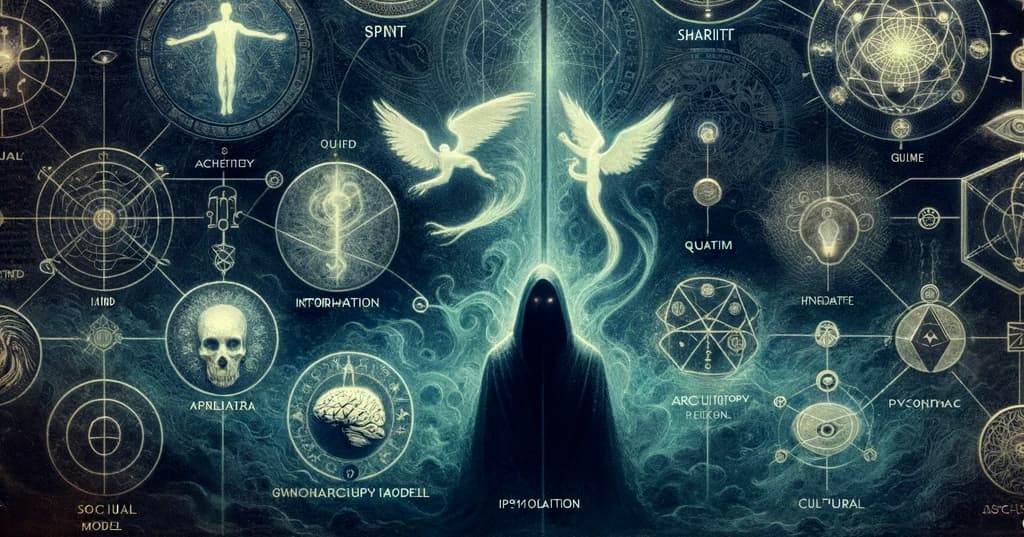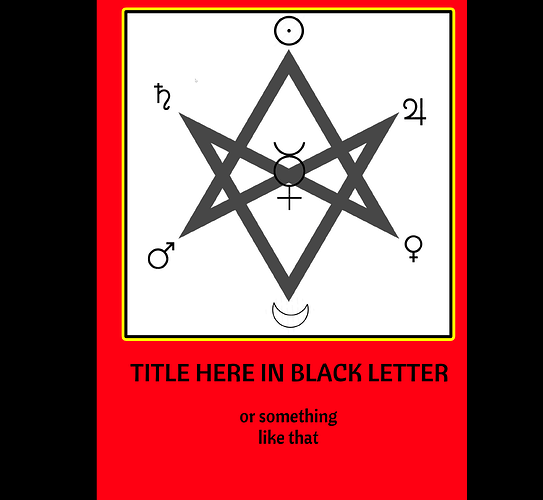Hated and loved by many, Aleister Crowley famously said “the spirits of the Goetia are portions of the human brain.” This may have been the very first hint of the Psychological Model of magick. Fast forward 120 years and today we have a variety of models to choose from, but are they all equal in value?
Side-note: Crowley was not a direct proponent of the psychological model, but that doesn’t stop people from interpreting it that way.
The purpose of this post isn’t to discuss the details and implications of each model. Our aim here is to provide a practical framework that can be used to approach the esoteric.
However… for the complete beginner looking to get acquainted I will include a brief overview of the most popular models below. You can tap on the title of each to get a short description.
Magic Model (or Energy Model)
This model suggests that magic operates through some form of objective, external force or energy. It posits that spells, rituals, and other magical acts have an effect on the world through supernatural, metaphysical, or subtle energies. This model might include the belief in universal energies or forces that can be manipulated through magical practice.
Spirit Model
This model is more specific than the general magic model and posits that magical effects are produced through the intervention of non-physical entities or spirits. These could be deities, spirits of the dead, angels, demons, elementals, or other types of spiritual beings. Practitioners working within this model often engage in practices like invocation, evocation, channeling, or mediumship to interact with these entities.
Mind Model
This model views magical practices as primarily psychological tools. The changes brought about by magic are seen as changes in the practitioner’s mind, which then may influence their perception and interaction with the world.
Information Model
This is a more modern interpretation and aligns with ideas from quantum physics and theories of information. It suggests that magic works by influencing the information or patterns that underlie reality. Practitioners working with this model might view spells and rituals as ways to interact with the informational aspect of reality.
Psychological Model
Similar to the Mind Model, the Psychological Model interprets magical practices as symbolic actions that affect the unconscious mind. It leans heavily on Jungian psychology and the concept of archetypes, viewing deities and spirits as manifestations of the collective unconscious.
Sociocultural Model
This model emphasizes the role of culture, tradition, and social dynamics in magical practices. It suggests that the efficacy of magic is partly rooted in its cultural context and the shared beliefs and practices of a community.
Note: In my experience the Spirit Model and the Psychological Model are the most popular and most frequently discussed in occulture.
Smelling the BS
Robert Anton Wilson is a man whose mind is of rare brilliance and I’m going to lean on him for a moment. He often liked to refer to belief systems as “BS”. Conveniently you can also take the acronym to mean “bullshit”. In this post we will use it to mean both at the same time. Let us then endeavour in removing the BS from magick and see where we end up.
Proponents of the spirit model will often lean on claims of ancient forces and will dismiss doubters by calling them uninitiated. On the other hand those who prefer the psychological model will smirk back and say people who believe in spirits are childish and superstitious. Beyond that we have the super smart ass who thinks simulation theory, quantum physics, or some other BS makes them smarter than both of the aforementioned.
Regardless of which model we look at, they all have two things in common:
-
They are obviously about the study and practice of magick, duh
-
They scoff at the other schools of thought, guzzling their own BS
Conveniently, none of the sides have any undeniable proof to back up their assumptions. Better yet, one can just as easily have inexplicable and wondrous experiences regardless of which direction they choose to lean. As a cherry on top multiple people can have the same experience and shove their own BS on top without any difficulties.
To be honest, it matters little how you rationalize magick.
Removing the BS
I think it’s important to realize that every single model of magick is based on rationalizations. We are trying to explain something inexplicable. We’ve seen that the results don’t care about the rationalization, yet we still try to cling to some rationally understood truth. Worse yet we ARGUE about it and spend precious, fleeting time trying to pin down the most subtle of mysteries.
“Separate the earth from the fire, the subtle from the gross”
- The Emerald Tablet of Hermes Trismagistus
Ironically enough the word for “soul” in Ancient Greece was “psyche”. By the end of his life Carl Jung’s definition of the collective unconscious was practically indistinguishable from how the Greeks saw the world of Daemons and spirits. Most Buddhist schools don’t see any conflict between the idea of spirits, mind[ness] pervading all, and the non-dual Emptiness that is the basis of both of those appearances.
It is similar to the parable of the blind men and the elephant . It seems, quite frankly, that the more someone tries to argue that their labels are the most correct ones, the further they’ve shoved their head up their own BS. The most accomplished minds, regardless of which school they stem from, are not so eager to claim that words and concepts can define the undefinable or explain the inexplicable. More importantly they are eager to re-define their own ideas rather than digging their heels in and assuming they were right all along.
So how does clearing away concept labels and rigid definitions help us in the practice of magick and mysticism?
Suspension of Belief
Our beliefs systems (BS) limit us intellectually. The moment we believe we “know” something, we quickly discard exploring any other possibilities. At the same time we invest ego into these beliefs and experience cognitive dissonance any time someone challenges them. In every sense our beliefs make us dumb, rigid, and limited. Beliefs should at best be considered theories.
In chaos magick circles the term “belief as a tool” is thrown around frequently, along with the words “nothing is true”. Personally I have many criticisms towards how most people use these platitudes, but I reserve all judgement when it comes to the results that we’ve seen come out of the truly talented from this latest breed of magi. I mean who the fuck would have thought you can use Mickey Mouse as a deity in your rituals and have it work as effectively as [take your pick of classic deities]?
Chaos magicians tend to deep dive into various BS reality tunnels to experience the full breadth of magical and religious experiences. For this I commend them. However I would like to point out that the downfall of chaos magick as a collective is that a major portion of the practitioners tend to avoid doing any work that requires a deep, long commitment. They’re especially resistant to taking on mentors and gurus because they feel like their ability to switch between belief systems somehow makes them more realized than their more classical counterparts. In short they develop meta-BS and tend to stay at the surface level of any system of initiation and run in the opposite direction of anything hierarchical.
This isn’t to say there are no capable chaos magicians, I have met many who are extraordinary. If I had to guess, I would say that it is likely that chaos magicians transcend their meta-BS at the same frequency and rate as practitioners of prior schools of thought transcended their own BS. Perhaps the issue isn’t in the particular system itself but rather that the average person is just not capable of putting in the effort necessary to reach the highest peaks.
There are no shortcuts, just different paths.
A WORKING Model
To summarize even when our BS is about transcending BS there is still a big tendency to get stuck in the muck of our beliefs. One may sound more clever, another may sound more scientific, and a third might sound super Woo – but what ACTUALLY makes a difference? The deciding factor across all schools of western occult, and even eastern occult, is first-hand experience and effort… Doing the great work.
“The map is not the territory”
- Alfred Korzybski
A true magi, mystic, or really any practitioner is distinguished by having actually explored the territory and done the practice. Prodding at reality, working at uniting the opposites of the soul(psyche), and letting the fire of curiosity lead them while the sword of skepticism cuts away the BS that tries to stick them down.
Magick is in every single way mercurial; it toys with our beliefs, it challenges our willpower, it hides when we seek and tends to find us when we hide. The fourth power of the Sphinx is to keep silent and in all honesty this is the best advice. Less debating, more doing. Don’t be an armchair magician who has a million words but only one or two experiences. It is much better to be an agnostic fool with a life rich in mystery and inexplicable wonder.
What is your most inexplicable experience?

